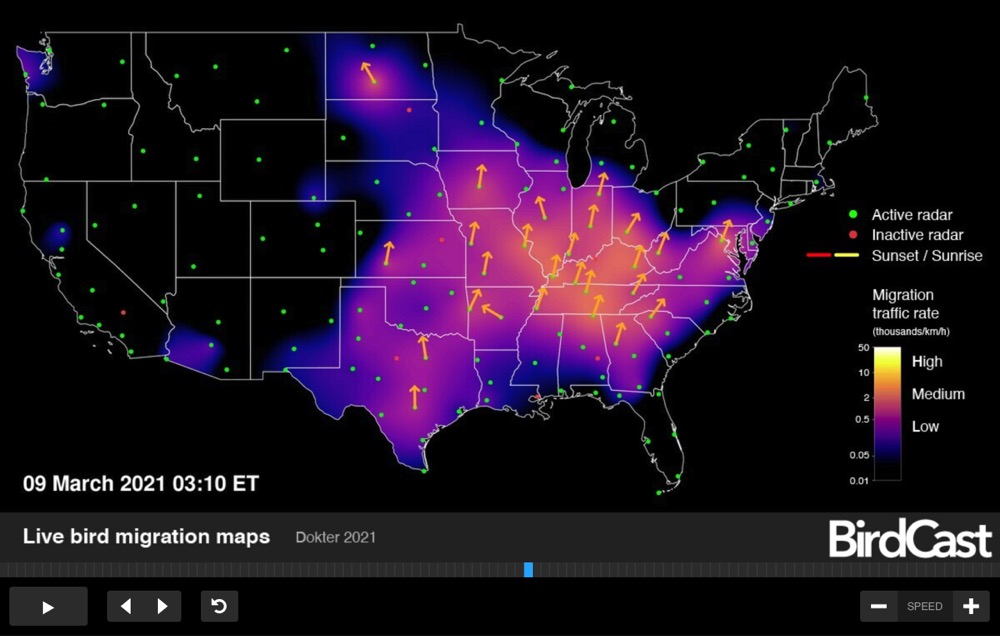
We talk about the weather more often than we talk about most things, other natural phenomena included. We certainly talk about the weather more often than we talk about birds, much to the disappointment of ornithological enthusiasts. This could be down to the comparative robustness of weather prediction, both as a tradition and as a daily technological presence in our lives. We can hardly avoid seeing the weather forecast, but when was the last time you checked the bird forecast? Such a thing does, in fact, exist, though it’s only come into existence recently, in the form of Birdcast, which provides “real-time predictions of bird migrations: when they migrate, where they migrate, and how far they will be flying.”
Developed by Colorado State University and the Cornell Lab of Ornithology, BirdCast offers both live bird migration maps and bird forecast migration maps for the United States. “These forecasts come from models trained on the last 23 years of bird movements in the atmosphere as detected by the US NEXRAD weather surveillance radar network,” says BirdCast’s web site.
Unprecedented in both the kind of information they provide and the detail in which they provide it, “these bird migration maps represented the culmination of a 20-year long vision, so too the beginnings of new inspiration for the next generation of bird migration research, outreach and education, and application.”
You can learn more about the development and workings of BirdCast in the recorded webinar below, featuring research associate Adriaan Dokter and Julia Wang, leader of the Lights Out project, which aims to get Americans spending more time in just such a state. “Every spring and fall, billions of birds migrate through the US, mostly under the cover of darkness,” says its section of BirdCast’s site. “This mass movement of birds must contend with a dramatically increasing but still largely unrecognized threat: light pollution.” The goal is “turning off unnecessary lighting during critical migration periods,” and with spring having begun last weekend, we now find ourselves in just such a period. Luckily, our fine feathered friends shouldn’t be disturbed by the glow of the BirdCast map on your screen. View live BirdCast maps here.
via Kottke
Related Content:
What Kind of Bird Is That?: A Free App From Cornell Will Give You the Answer
Cornell Launches Archive of 150,000 Bird Calls and Animal Sounds, with Recordings Going Back to 1929
Watch “The “Art of Flying,” a Short Film Capturing the Wondrous Murmurations of the Common Starling
Based in Seoul, Colin Marshall writes and broadcasts on cities, language, and culture. His projects include the Substack newsletter Books on Cities, the book The Stateless City: a Walk through 21st-Century Los Angeles and the video series The City in Cinema. Follow him on Twitter at @colinmarshall or on Facebook.
BirdCast: You Can Now Forecast the Migration of Birds Across the U.S. Just Like the Weather is a post from: Open Culture. Follow us on Facebook, Twitter, and Google Plus, or get our Daily Email. And don't miss our big collections of Free Online Courses, Free Online Movies, Free eBooks, Free Audio Books, Free Foreign Language Lessons, and MOOCs.
from Open Culture https://ift.tt/3dbb4Gg
via Ilumina

Comments
Post a Comment